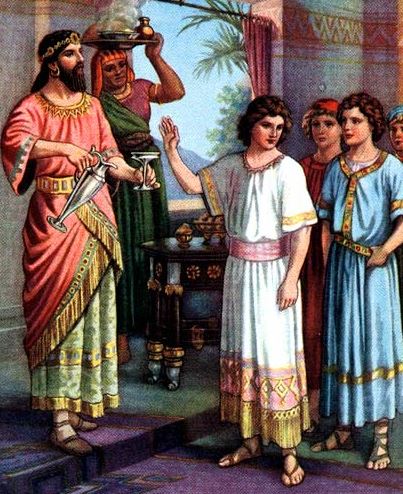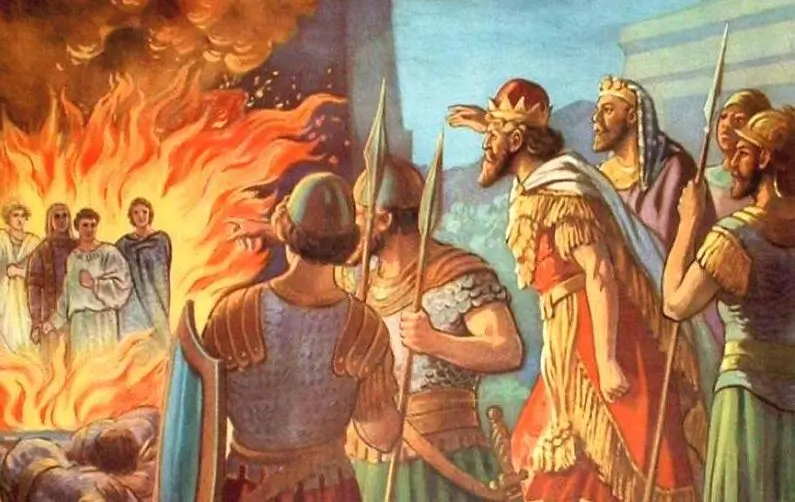The story of Abednego is one of the most well-known narratives in the Bible, often associated with the fiery furnace incident in the Book of Daniel. Along with Shadrach and Meshach, Abednego is remembered for his remarkable faith and unwavering commitment to God, even in the face of certain death. These three men are famous for defying King Nebuchadnezzar’s command to worship a golden statue, choosing instead to honor their faith. This act of defiance led to their miraculous survival in a blazing furnace, a powerful testament to God’s protection.
However, while the name “Abednego” is widely recognized through this story, many may not know that it is not his original name. So, what is the real name of Abednego? The answer lies in the history behind the Babylonian exile and the renaming of these young Jewish men by King Nebuchadnezzar.
The Biblical Story of Shadrach, Meshach, and Abednego
The story of Shadrach, Meshach, and Abednego takes place in the third chapter of the Book of Daniel. The Babylonian King Nebuchadnezzar, in an effort to consolidate his power, ordered the construction of a massive golden statue and commanded that everyone in his kingdom bow down and worship it. Anyone who refused would be thrown into a fiery furnace as punishment.
Shadrach, Meshach, and Abednego, three Jewish young men who had been taken into Babylonian captivity, found themselves in a difficult position. Though they held positions of influence in the king’s court, they refused to worship the idol, staying true to their faith in the God of Israel. The king, enraged by their disobedience, ordered that they be thrown into a furnace so hot that it killed the soldiers who threw them in. Yet, miraculously, the three men emerged unharmed, their clothes untouched by the flames. This divine intervention not only spared their lives but also demonstrated their steadfast faith in God, inspiring generations of believers.
The Real Name of Abednego
While most people recognize “Abednego” from this fiery furnace story, it is actually a Babylonian name. The real name of Abednego is Azariah. Azariah, along with Shadrach (Hananiah) and Meshach (Mishael), was given a new name by King Nebuchadnezzar after they were brought to serve in the king’s court. The name “Azariah” is of Hebrew origin and means “Yahweh has helped,” reflecting the deep faith in God that these young men maintained despite their circumstances.
In the Bible, Azariah’s Hebrew name is a reminder of his connection to God, who protected him through the fiery trial. This renaming was part of the king’s efforts to assimilate these men into Babylonian culture and erase their Jewish identity. However, Azariah’s faith remained unchanged, and his story serves as an example of devotion to God under extreme pressure.

Babylonian Name Changes: The Case of Abednego
When King Nebuchadnezzar took Hananiah, Mishael, and Azariah into his service after their capture during the Babylonian exile, he made a significant decision to change their names. This was a common practice in the ancient world, especially for those who were brought into royal service or conquered by foreign powers. The renaming served both cultural and political purposes, aiming to erase their former identity and integrate them into the Babylonian society.
King Nebuchadnezzar assigned them Babylonian names that reflected the gods and beliefs of the Babylonian culture. Hananiah, whose name meant “Yahweh is gracious,” was renamed Shadrach, a name thought to mean “command of Aku,” referring to the Babylonian moon god. Mishael, whose name meant “Who is like God?” became Meshach, likely derived from the name of the Babylonian goddess Shakti. Azariah, whose name meant “Yahweh has helped,” was renamed Abednego, which means “Servant of Nego” (or Nebo), a Babylonian god of wisdom, learning, and writing.
These name changes were not just symbolic—they were part of a larger effort by King Nebuchadnezzar to fully assimilate these Jewish captives into Babylonian culture. By giving them new names tied to Babylonian gods, the king hoped to sever their ties with their Jewish heritage and religion. However, despite the new names, the faith of Shadrach, Meshach, and Abednego remained resolute, and their story of defiance against the king’s idol continues to inspire believers to this day.
The Meaning of the Name “Abednego”
The Babylonian name Abednego is derived from the phrase “Servant of Nego” (or Nebo), reflecting a key aspect of Babylonian religious beliefs. Nego, also known as Nebo, was a deity associated with wisdom, writing, and the arts of learning. In this context, the name Abednego signifies a servant or worshiper of this particular god, representing a complete alignment with Babylonian culture and religion.
In contrast, Azariah’s original Hebrew name has a very different meaning. The name Azariah means “Yahweh has helped,” a direct reference to the Hebrew God who offers divine assistance. While the Babylonian name Abednego represents submission to a pagan deity, Azariah emphasizes the grace and protection of the God of Israel. This stark contrast highlights the clash between the two identities: the foreign name imposed upon Azariah by King Nebuchadnezzar and the identity he retained in his heart—his unwavering devotion to the God of Israel, even in the face of extreme pressure.
The renaming of Azariah to Abednego serves as a reminder of the tension between the faithful adherence to one’s beliefs and the external forces that seek to assimilate or change those beliefs.
Themes of Faith and Devotion
The story of Shadrach, Meshach, and Abednego is one of unwavering faith and devotion, even when faced with death. Despite being offered their lives in exchange for bowing to King Nebuchadnezzar’s golden idol, the three men refused. Their refusal to worship an image of gold was not just an act of defiance, but a declaration of their loyalty to the God of Israel. In Daniel 3:16-18, they boldly stated that their God was able to save them from the furnace, but even if He chose not to, they would not worship the king’s idol.
Their faith was not based on the hope of escape, but on the trust that God’s will would be done, regardless of the outcome. This act of devotion under extreme pressure reveals a powerful message about remaining true to one’s beliefs, even when the consequences seem overwhelming.
In the end, God’s protection was evident when the three men were thrown into the fiery furnace. They emerged unharmed, with not even the smell of smoke on their clothes. This miraculous rescue underscored the theme of divine intervention and protection. The flames could not touch them because of their faith, and this act of divine deliverance became a testament to God’s power and the strength that comes from trusting in Him.
Why the Real Name of Abednego Matters
Understanding the real name of Abednego—Azariah—is important for several reasons, especially in the context of the Bible. The Hebrew name Azariah, meaning “Yahweh has helped,” highlights the relationship between the individual and God. It reinforces the theme that God’s help and protection are available to those who remain faithful to Him, even in the most difficult circumstances. This is a foundational aspect of the biblical narrative: God’s people are known by their devotion to Him, not by the names imposed upon them by foreign powers.
The distinction between the Hebrew names of Shadrach, Meshach, and Abednego and their Babylonian counterparts underscores a key theme in the Bible: identity. Their original names connected them to their heritage and faith, while their Babylonian names were meant to erase those ties and assimilate them into a pagan culture. The story reveals how their true identities, as reflected in their Hebrew names, remained intact, despite the king’s efforts to change them. This highlights the biblical principle that one’s identity in God transcends external pressures and attempts at assimilation.
Through this, we gain a deeper understanding of the biblical themes of faith, identity, and divine protection. Their names carry a weight of meaning that ties their individual stories to a larger narrative of God’s faithfulness to His people.
Conclusion
The real name of Abednego was Azariah, which means “Yahweh has helped.” This name is significant, not only because it reflects his Hebrew heritage but also because it highlights the divine help and protection that Azariah, along with Shadrach and Meshach, experienced in the fiery furnace. Their unwavering faith in God and refusal to bow to the idol has inspired countless generations.
The lasting legacy of the story of Shadrach, Meshach, and Abednego is a powerful message about devotion to God, even in the face of danger. It shows that standing firm in one’s faith, no matter the cost, is the ultimate act of trust in God’s plan and provision.
In the broader biblical context, names hold great significance. The names given to these men were more than just labels—they were a reflection of their identity and relationship with God. Through their story, we learn that while external forces may try to change our names or our identity, our true identity is found in our relationship with God and the faith we hold in Him.
Frequently Asked Questions (FAQs)
1. What is the real name of Abednego?
The real name of Abednego, as mentioned in the Bible, is Azariah. The name Abednego is a Babylonian name given to him by King Nebuchadnezzar during the Babylonian exile.
2. Why did Abednego’s name change?
Abednego’s original name, Azariah, was changed by King Nebuchadnezzar as part of an effort to assimilate him and his companions, Shadrach and Meshach, into Babylonian culture. This renaming reflected the Babylonian gods and was meant to sever their ties with their Hebrew heritage.
3. What does the name Abednego mean?
The name Abednego means “Servant of Nego” (or Nebo), a Babylonian god of wisdom, learning, and writing. It reflects the Babylonian culture that sought to reshape their identities.
4. What does the name Azariah mean?
Azariah is a Hebrew name that means “Yahweh has helped.” It emphasizes God’s divine assistance and protection, which was central to Azariah’s identity as one of the three faithful Jewish men.
5. What is the story of Shadrach, Meshach, and Abednego in the Bible?
The story of Shadrach, Meshach, and Abednego is found in the Book of Daniel (Daniel 3). It tells how the three men refused to bow to a golden statue set up by King Nebuchadnezzar. As a result, they were thrown into a fiery furnace, but they were miraculously saved by God, without even a hair being singed, showcasing their faith and God’s protection.
6. Why is the story of Shadrach, Meshach, and Abednego important?
The story is important because it demonstrates unwavering faith in God, even in the face of life-threatening danger. It teaches the value of staying true to one’s beliefs and trust in God’s deliverance, even under intense pressure.
7. What is the significance of the Hebrew and Babylonian names in the story?
The difference between the Hebrew names (Shadrach, Meshach, and Abednego’s original names) and their Babylonian names highlights the conflict between their identity as God’s people and the efforts of the Babylonians to assimilate them into their culture. Their Hebrew names reflected their faith in the God of Israel, while the Babylonian names were attempts to disconnect them from their heritage.
8. How did God protect Shadrach, Meshach, and Abednego in the furnace?
According to the story in Daniel 3, God miraculously protected Shadrach, Meshach, and Abednego when they were thrown into the fiery furnace for refusing to worship King Nebuchadnezzar’s idol. They emerged from the furnace unharmed, with no signs of burns, and not even the smell of smoke on their clothes, demonstrating divine protection and intervention.
9. What is the moral lesson of the story of Shadrach, Meshach, and Abednego?
The moral lesson of the story is about standing firm in faith, even in the face of persecution or death. It also highlights the power of God’s protection and the importance of remaining true to one’s beliefs, no matter the external pressure to conform.




